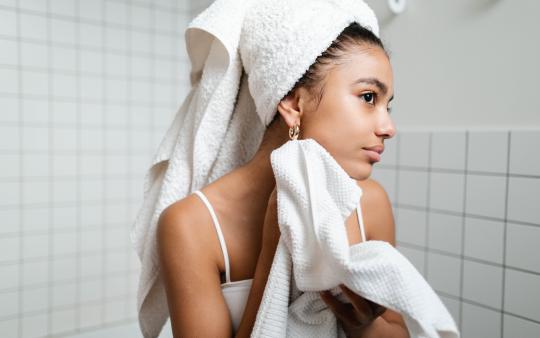Hormones, inflammation, and stress are all contributing factors to teen acne and skin care concerns. While the general causes may be widely known, the specifics on how to treat these causes are a much larger mystery to many. In a desperate attempt to tame those growing eruptions, teens and tweens can often turn to harsh chemical products, which may actually cause further damage to their skin as well as their larger hormonal health.
The University of Berkeley did a study in 2016 that noted the disproportionate effects of common skin care chemicals (such as makeups and lotions) on the teen hormonal system. Study lead and associate director of the UC Berkeley Center for Environmental Research and Children’s Health, Kim Harley, shared her concerns: “Teen girls may be at particular risk since it’s a time of rapid reproductive development, and research has suggested that they use more personal care products per day than the average adult woman.”
And while teen girls were found to be at higher risk of exposure to disruptive skin care chemicals (likely due to heavier use of products), establishing healthy skin care routines is essential for all genders. To explore how to establish healthy skin and hormone habits at home and when you should seek professional support, I spoke with two experts on hormonal and skin health from Meridian Medicine—Dr. Mona Fahoum, ND, and Dr. Catherine E. Chatal, MD.
Teenage Skin Care Routines
At puberty, teens need to shift from just face washing to a more specific skin care routine. Dr. Fahoum describes this as “a time of hormonal shifts that result in increased oil production and changes in skin flora.” When establishing a beginner skin care routine, it’s best to keep it simple and not overcomplicate it. Dr. Chatal recommends washing with a gentle cleanser and a chemical exfoliant like salicylic acid. Follow with a moisturizer and repeat twice a day.
As most of us know all too well, acne isn’t always limited to the face. Some teens also struggle with “bacne” or body and back acne. Since sweat and bacteria literally block the pores that result in the creation of a zit, it’s no surprise these complaints are widespread. Body acne should be managed the same as the face, with gentle and regular cleansing.
Dr. Fahoum explains that there are often hormonal factors with more severe body acne as well. “Often there are testosterone issues and it's not just the overproduction [of it], but how that person is clearing, breaking down and removing those from the body.” Dr. Fahoum adds, “Gut function is a huge factor.”

“All our hormones get made and used by the body, then they’re supposed to go to the liver for disposal. Once processed, they get put in the colon for removal — if someone has gut issues, like constipation, they don’t get removed, but instead, get reabsorbed and go back around for more!” Eating healthy snacks is a fantastic way to support gut health for healthier skin. Dr. Fahoum suggests adding fibre to the diet and incorporating cruciferous vegetables like broccoli, kale, and cabbage. Dr. Chatal suggests whole foods and minimally processed snacks like fruit, veggies, and nuts in moderation.
Gender-Based Acne Complaints
All sexes and genders can struggle with acne. When the root causes come down to diet, the clearing of toxins, overproduction of hormones, and overall hygiene – it’s clear that hormonal acne is universal. Yet while acne is universal, some of the root causes of acne issues may have more basis in gender.
Males may have a tendency towards overproduction of testosterone, while females will often have acne concerns strongly related to their menstrual cycles. Adolescent menstrual cycles often accompany hormonal swings as the girl’s body naturally works to find an equilibrium. These swings can affect mood, hormones, and skin. As Dr. Fahoum explains, “The brain and the ovaries have a new relationship and they have to get to know each other. In so doing, there can be highs and lows, total wins and total misses, like in any relationship.” These swings can be exacerbated by the body not easily removing toxins too.
Birth control is another contributing factor to teen skin and hormonal health, but as Dr. Chatal says, “Birth control can be both good and bad.” Where hormonal birth control may help one teen, it may contribute to acne in another, although lower doses tend to be less problematic. Dr. Fahoum agrees, noting that birth control “can be really helpful while we address the foundational issues, but sometimes a band aid is the exact thing we need to make long term headway!”
Trans teens may also have hormonal acne concerns, but hormone balance may be approached differently for this group. Dr. Fahoum explains that while the foundations of skin and hormone health remain the same (i.e., water, nutrition, and skin care), the specific treatment may vary. “I wouldn’t use an herb or supplement to increase progesterone or decrease testosterone in a trans-male for example, who is trying to suppress the female hormones in favour of testosterone,” the doctor explains.
Identifying & Treating Problem Acne
While much of acne and hormonal healthcare can be performed at home, there are times when consulting a medical professional is a good idea. Both Drs. Chatal and Fahoum agree that establishing an early baseline with a professional is best. By getting guidance on healthy skin care and nutrition early, some of the worst symptoms of problem acne may be avoided, while simultaneously cultivating a healthy self-love and self-care routine for teens and tweens. Adds Dr. Fahoum, “Obviously there will always be a few zits—and of course, it will always be before the big dance, but we have a better chance of really minimizing these issues if we can intervene early.”
While there aren’t always simple solutions, professional guidance can help you avoid damaging and harsh chemical solutions. “The sooner the better when puberty arrives, or the acne hits — we can get ahead of it!” says Dr. Fahoum. The doctor concludes that with “clean eating, I try to aim for teens and their parents to be realistic — they’re going to eat pizza — but if we can aim for good nutrition and good skin care 80 percent of the time, we are going to be winning! “
A Primer on Common Skin Care Terms
Understanding skin care and hormonal health for teens and tweens is easier if you know the language around it. Dr. Fahoum and Dr. Chatal define and discuss some of the common terms you may come across in your skin care research.
● Doxycycline — Doxycycline is a treatment for different bacterial infections. Dr. Fahoum shares that doxycycline “can be very useful in clearing things up,” but using this product alone won’t address the root causes of the problematic acne. She describes the product as “only a band aid” and adds that “actually addressing the gut bugs helps the skin heal!”
● Nodule – Dr. Chatal describes this as what many refer to as a cyst, located below the surface level of the skin. Adds Dr. Fahoum, “When I see cystic acne, I think about the whole system. What is happening with the hormones for this individual? What is happening with their skin microbiome? What is happening with their self-care and products being used? “
● Toner - Toner is a product that is used after cleansing. Dr. Chatal cautions, “I'm not a big fan as it disrupts the skin's microbiome.”
● Glycolic acid - Glycolic acid is a chemical exfoliant that Dr. Chatal touts as “much better and gentler than a physical exfoliant.” While this exfoliates through chemical reactions, glycolic acid is actually an alpha hydroxy acid (AHA) which is naturally derived from plants.
For skin care products to avoid, check out our guide to help you avoid harsh chemicals.









